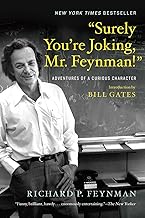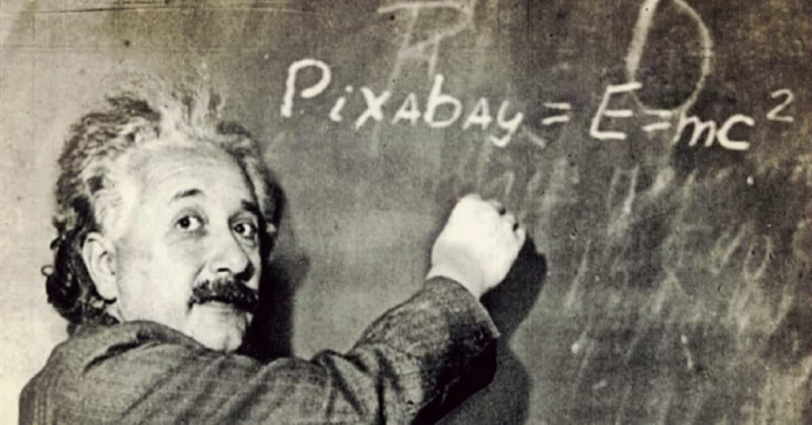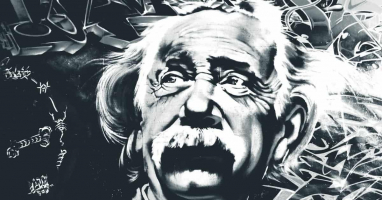I wrote this article in Japanese and translated it into English using ChatGPT. I also used ChatGPT to create the English article title. I did my best to correct any translation mistakes, but please let me know if you find any errors. By the way, I did not use ChatGPT when writing the Japanese article. The entire article was written from scratch by me, Saikawa Goto.
Introduction
Movies and books covered in this article

Three takeaways from this article
- As a scientist, he was a top-notch genius, but he was also known for his highly unscientific episodes.
- He was considered a prank-loving liar, and nobody believed what he said.
- There were even prank episodes during the time he was involved in the development of the atomic bomb.
Self-introduction article


Published Kindle books(Free on Kindle Unlimited)
“The genius Einstein: An easy-to-understand book about interesting science advances that is not too simple based on his life and discoveries: Theory of Relativity, Cosmology and Quantum Theory”
“Why is “lack of imagination” called “communication skills”?: Japanese-specific”negative” communication”
The quotes in the article were translated using ChatGPT from Japanese books, and are not direct quotes from the foreign language original books, even if they exist.
Feynman’s Autobiography, Which Depicts His Overwhelming “Genius” and “Anecdotal Power,” is a Work that Even Draws Without Touching Scientific Knowledge

Compared to probably the most famous scientist, Einstein, Newton, who is famous for the apple anecdote, or Hawking, known as the “physicist in a wheelchair,” the name “Feynman” may not be famous. I think there are not many people who like science and mathematics who do not know Feynman, but those who are strongly interested in the humanities may not be familiar with him. Feynman’s most widely known achievement in the general public is probably “the investigation of the cause of the Space Shuttle Challenger accident.” However, even if you knew that there was a scientist who investigated the cause of the Challenger accident, many people may not recognize that scientist as Feynman.

However, Feynman, while certainly possessing a tremendous intellect as a scientist, is also incredibly entertaining in a way that is not necessarily related to science. In fact, I even think that those who are interested in the humanities may find Feynman’s anecdotes particularly amusing.
This article introduces the world-renowned bestseller, “Surely You’re Joking, Mr. Feynman!”, a book written by a scientist that hardly talks about science. In other words, it can be said that “Feynman’s daily life is filled with entertaining anecdotes that are completely understandable without talking about science.”

For example, when he was living in Brazil, he tried playing an unfamiliar instrument during the samba season. He’s the kind of person whose profession you’d never guess if he wasn’t introduced as a “scientist,” someone who continues to research in a corner of a strip club or who improves his drawing skills to the point of holding a solo exhibition, among other things.
Even if you’re someone who says “I’m not interested in physics” or “I hate science because it’s difficult,” I think you’ll find it an interesting read.
Feynman’s achievements as a scientist are summarized in the following article. If you’re interested, I hope you’ll read it along with this one.

How Feynman was Treated and How He saw Things
Let me introduce an episode that shows very well how Feynman was treated and how he saw things.
Feynman was always playing pranks, and even as a student, he did things like this: There was a room with two entrances for some reason, and when he found out that one of them had been stolen, Feynman stole and hid the remaining door.

The owner of the room asked various people if they knew the whereabouts of the door, but no one knew. Naturally, when Feynman was asked, he honestly answered, “I stole the door,” but because he had a reputation for “constantly lying and deceiving people,” no one believed him.

Afterwards, at dinner, a few people discussed this problem and decided to ask everyone present whether or not they had stolen the door. Of course, since everyone else had no recollection of it, they answered “I don’t know.” Feynman, on the other hand, honestly answered “I did it” again. However, nobody believed him and instead scolded him, saying “Don’t be ridiculous, Feynman.”

Just from this story, I think we can understand right away what kind of person Feynman was and how he was treated.
In addition, there is a story like this. Feynman was invited by a certain university, but he refused after seeing the amount of salary offered. It wasn’t that it was low, it was actually high. He declined like this, as written in this book.
After reading about the salary, I decided that I absolutely had to turn down the job offer. You may wonder why I would refuse such a high-paying job, but the truth is that I have something I’ve always wanted to do – namely, surround myself with wonderful women in an apartment and buy them nice things – and with that salary, I could actually do it. And if that happened, it goes without saying what kind of trouble I would get into. I would constantly worry about what she was doing and there would inevitably be arguments at home. With these concerns, I would become uneasy and unhappy, and I wouldn’t be able to focus on my physics research, causing me to become a mess! What I always want to do is actually not good for me. So I have decided that I cannot accept this offer.

You might find it a rather unusual “reason for refusal.”
In my impression, the reason may not be so much about the salary, but because he “did not feel excited” about the offer. I think Feynman was always devoted to living his life by following what he found interesting, and his sense of “interest” may not be something that can be achieved with money. However, he may not have explicitly said that, and instead presented the reason as being the salary. In any case, I think he was an extraordinary person.

Feynman seemed to enjoy observing people and society, and you can feel his sharp perspective in various situations. One interesting episode was about the difference between “memorizing” and “understanding”.

While teaching in Brazil, Feynman faced a very strange situation. Although it was exactly the same question, students could answer it smoothly or be at a loss depending on how it was asked. Based on that experience, Feynman once revealed the following story at a lecture.

Once upon a time, there was a Greek scholar who loved Greek language passionately. This scholar knew that there were not many children learning Greek language in his own country. However, when he visited another country, he was thrilled to learn that even cats, preschoolers, and everyone else there were learning Greek language.
The scholar asked a student who came to take an exam to get a degree in Greek language in that country, “What did Socrates think about the relationship between truth and beauty?” This was an easy question for anyone who was learning Greek language. However, the student couldn’t answer this question at all. Then, the scholar asked again, “What did Socrates say to Platon in the third part of ‘The Symposium’?” The student was able to recite the passage from “The Symposium” flawlessly in beautiful Greek language.
However, the answer to “What did Socrates say to Plato in the third part of The Symposium?” was precisely about “Socrates’ thoughts on the relationship between truth and beauty.” This student was good at “memorizing things” but not at “understanding them.”

If I had read this story when I was a student, it might have been painful to hear. No, maybe when I was a student, I thought I “understood it,” so I might not have realized that I was “just memorizing” it. In any case, I felt that it was a very essential point about “learning something.” Feynman was also good at explaining stories like this in an easy-to-understand way.

Furthermore, Feynman had this episode:
During his student days, he got involved in a biology course unrelated to his major. He had the opportunity to present on “cat muscles” for some reason. Feynman started by listing the names of various muscles found in a book.
Before he could finish, the classmates said, “We all know that stuff.” Indeed, they might be tempted to say so. However, what Feynman said afterward was interesting.
No wonder I can quickly catch up with those of you who have been doing biology for four years.

Do you understand the meaning? Feynman said, “You can’t make progress in learning and research if you’re memorizing things that you can understand just by looking at a book.” I think there is some value in “memorizing”, but I have to admit that I agree with Feynman’s point. I think his comments make us think about “education” in a deeper way.
In many ways, Feynman had a sharpness that cut to the “essence” of things.

How Much of a “Genius” was Feynman?
The book introduces various episodes that demonstrate Feynman’s genius.

For example, a famous story that shows Feynman’s genius is that he only used “ideas he created or proved himself.” Even after becoming a scientist, he often did things like “re-solving problems that had already been proven” in his own way. He showed signs of this attitude even in his student days, immersing himself in inventing or rediscovering mathematical theorems and physical laws in high school.

This stance by Feynman later led to the achievement of “capturing quantum mechanics with a new concept called path integral”. This approach of “path integral” brought about significant contributions to quantum mechanics and completely transformed the way of viewing it. However, on the other hand, even a layman like me couldn’t help feeling that “if Feynman had stepped into more unexplored territory, even more diverse knowledge could have been revealed.”

Feynman didn’t just blindly believe in other people’s papers, whether it was his field of expertise or not. He conducted various experiments as his curiosity led him, such as wondering how ants search for food after observing ants in his room during college. He then formed a hypothesis, conducted experiments himself, and deciphered the mechanism. This episode shows that “curiosity” and “persistence” are the pillars that support Feynman’s genius.
Now, let me introduce an episode that shows how Feynman’s genius was out of this world even as a child. Although he was a physicist, he could solve difficult integrals that only mathematicians could solve, and it’s said that his high school teacher played a role in this.

One time, Feynman’s high school physics teacher ordered him to stay after class and told him this.
Feynman, you talk during class and are disruptive, but I know why. You’re bored, right? Here’s a book, go to the back of the room and study on your own. When you understand everything written in this book, you can talk in class again.

The teacher probably saw that Feynman was getting bored in class due to his genius. After that, Feynman really did study on his own with the book his teacher gave him in the back of the classroom during physics class. This style of learning might not be accepted in Japanese schools, but I have heard that there is a movement in Japan to review education for geniuses called “the gifted”. I hope that they will meet adults like the teacher that Feynman was lucky enough to meet.

Episode of the Atomic Bomb Development Era
Feynman is also known to have been involved in the development of the atomic bomb at Los Alamos. In fact, it would be difficult to find a physicist in America at that time who was not involved in some way in the development of the atomic bomb, except for Einstein, who was Jewish and was regarded with suspicion.

However, the book does not contain any episodes of the “atomic bomb development” itself. Feynman seems to have been playing pranks as usual.
The information that “atomic bomb development was being carried out at Los Alamos” was a top secret at the time, so all letters exchanged between scientists at Los Alamos and the outside world were naturally censored. However, Feynman didn’t like that. So, he played various pranks to tease the censors.
First, he had his parents send a “coded letter.” Of course, the letter was stopped by the censors and Feynman was called in. But Feynman couldn’t decipher the code. He just told his parents to “send me a ‘coded letter’,” he didn’t know the key to decrypt it. Or perhaps we could say that parents who send “coded letters” at the behest of their sons are just as much as playful.

Once, something like this happened as well. Feynman’s wife knew that letters were being censored in Los Alamos, so she sent a letter saying, “It feels like someone is looking over my shoulder from XX, making it difficult to write.” However, the ink in the part that said “XX” had been blotchy. Feynman protested to the censor. This is because it was a rule that censors could read the contents but couldn’t alter the letter. However, the censor argued, “If I were going to do it, I wouldn’t use an eraser. I’d cut it out with scissors.”

Later, Feynman received a response from his wife saying, “No, I would never use an eraser. XX must have done it.” However, this time the part that said “XX” had been cut out with scissors. Once again, Feynman complained to the censor. Of course, this was another prank carried out with his wife’s help.

Feynman’s antics must have tired out the censor too. Feynman was told to tell his wife to stop mentioning censorship in her letters. He complied by writing to her, “I have received orders not to mention censorship in our letters.” However, he was called in for censorship again soon after. The censor told him not to use the word “censorship.” How was he supposed to tell his wife to stop censorship then? This book also records such comical exchanges.
Feynman played pranks on the censor just because he didn’t like censorship, and his persistence and humor are impressive.

Another interesting episode is Feynman’s relationship with Niels Bohr, who was treated like a “god” in the physics community at the time.
One day, Bohr was supposed to come to Los Alamos. And on that very morning, Feynman received a phone call from Bohr’s son. He said Bohr wanted to talk to you. Feynman, who was still young at the time, was just a small fry among the members of the atomic bomb development project. Nevertheless he was personally nominated by Bohr. When Feynman went to meet Bohr, it seemed to be about ways to increase the efficiency of the atomic bomb. Feynman tends to forget the other person’s position when it comes to scientific discussions, so at that time, he simply dismissed Bohr’s opinion.

Later, Feynman, who was a low-ranking employee at the time, had the opportunity to learn why Bohr wanted to meet with him. Bohr had once said something like this to his son.
Do you remember the name of that young man sitting in the back? He’s the only one who isn’t afraid of me and is willing to speak up even if he thinks my ideas are crazy. It’s pointless to discuss with those who just say “Yes, yes, Dr. Bohr, you’re absolutely right” no matter what we say when we talk about various ideas next time. Let’s first catch that man and talk to him before we move on.

I think Feynman’s style of not bowing to authority is great, but Bohr’s attitude of not being complacent with authority is also impressive. In later years, Feynman was also inadvertently put on the “authority” side when he received the Nobel Prize, and ended up carrying the burden of that. But I think the stance of “equality for all in the face of truth” is very desirable.

Conclusion
How was it? Although I only touched on a very small part of the contents of this book, I think there were many interesting parts that attracted your attention. There is no scientist who is both at the top of their field as well as full of interesting stories like the ones in this book. This work is packed with such interesting stories and even people who are not interested in science should find it fascinating to read.
I hope you will feel the hilarious life of an unconventional scientist.

Published Kindle books(Free on Kindle Unlimited)
“The genius Einstein: An easy-to-understand book about interesting science advances that is not too simple based on his life and discoveries: Theory of Relativity, Cosmology and Quantum Theory”
“Why is “lack of imagination” called “communication skills”?: Japanese-specific”negative” communication”







コメント